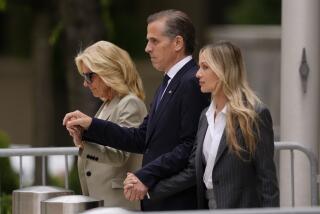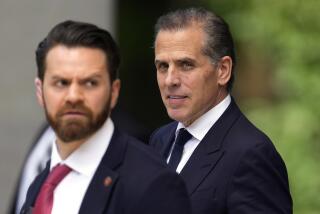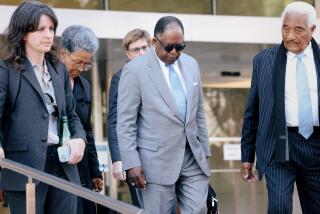Jurors found Libby likable, not believable
- Share via
WASHINGTON — There was a “tremendous amount of sympathy” for I. Lewis “Scooter” Libby among the 11 jurors deciding his fate. According to one panel member, some believed he was being made a “fall guy” for his White House superiors.
But when it got down to the basic question facing the jury, there was little doubt: Libby, they easily decided, was guilty as charged on four of the five counts lodged against him.
The jurors swept aside the main pillar of the defense -- that Libby was so overwhelmed by his job as Vice President Dick Cheney’s chief of staff that he could not be expected to recall details of conversations with reporters.
Speaking for the panel Tuesday after its verdict was announced, juror Denis Collins said he and his colleagues regarded this as “the least convincing thing” Libby’s lawyers put forward. A single word that Libby uttered when first answering questions about the case also proved telling.
In his grand jury testimony -- he did not take the stand in the trial -- Libby had claimed to have heard the identity of an undercover CIA officer from NBC News anchor Tim Russert, and to have been “surprised” that the morsel came up in conversation.
The jurors did not buy it, Collins said, because so many witnesses and pieces of evidence contradicted the claim that Libby had not known of Valerie Plame’s identity before then.
As Collins described it, the evidence against Libby began to mount in a very physical form inside the sixth-floor lounge as jurors deliberated for nearly two weeks.
They scrawled snippets of testimony and other details on 34 poster-size pieces of paper that they attached to the walls. The room became “like a cocoon,” Collins said, where jurors pushed two large tables together and spent days methodically going through the five felony counts.
Along the way, jurors sometimes gazed out the window and “lusted after” the hot dogs being sold by a vendor on the sidewalk below. But mostly they sifted through the evidence, and resisted taking straw polls before the details of the case could be fully digested.
“There were some incredibly good managerial-type people who just took everything apart into the smallest piece, put it in the right places,” Collins said. “It got to the point where ... opinion had very little to do with it. You just came to this conclusion that, wow, here it is, right before us.”
The verdict was read at noon by Juror No. 12, a woman wearing a white turtleneck and blue cardigan sweater. Neither her identity nor that of her colleagues -- including the female juror who was dismissed a few days into the jury’s deliberations -- was disclosed during the trial.
Collins said he decided to speak to reporters outside the courtroom because, as a former newspaper reporter himself, he felt a sense of obligation to answer questions about the process.
While the other jurors were whisked away from the courthouse in a van with tinted windows, Collins emerged and approached a bank of microphones and cameras where lead defense attorney Theodore V. Wells Jr. and Special Prosecutor Patrick J. Fitzgerald had made their post-trial statements.
Collins said jurors regarded Libby as a decent man. They liked the pleasant way he looked at the defense table each day, and the even tone of his voice in the tapes of grand jury testimony they heard during the trial.
Some wondered why Libby was being singled out. After all, other Bush administration officials had disclosed Plame’s identity to reporters as part of an effort to discredit her husband, Joseph C. Wilson IV, and his criticisms of the case for war with Iraq. Yet those other officials never faced criminal charges.
“There was a tremendous amount of sympathy for Mr. Libby on the jury,” Collins said. “It was said a number of times: What are we doing with this guy? Where’s [top White House political aide Karl] Rove, where are these other guys?”
Libby, Collins said, “was the fall guy. He was tasked by the vice president to go and talk to reporters.”
Collins insisted that neither politics nor opinions on the war colored the jury’s deliberations. “This was not a question of who can we punish for going to Iraq,” he said.
Jurors understood the limited scope of the trial -- namely, that Libby was not charged with leaking Plame’s identity but with lying to prosecutors who were investigating the matter.
The indirect connection to the underlying crime contributed to a sense of regret among some jurors, Collins said; they were uncomfortable with the idea of passing judgment on Libby, even though they were convinced he was guilty.
Collins, who identified himself as a registered Democrat, expressed that ambivalence about the outcome.
“It’s not like I would vote for Mr. Libby if he ran for office,” he said. “But I certainly felt for him. We all did.”
adam.schreck@latimes.com
More to Read
Get the L.A. Times Politics newsletter
Deeply reported insights into legislation, politics and policy from Sacramento, Washington and beyond. In your inbox twice per week.
You may occasionally receive promotional content from the Los Angeles Times.










